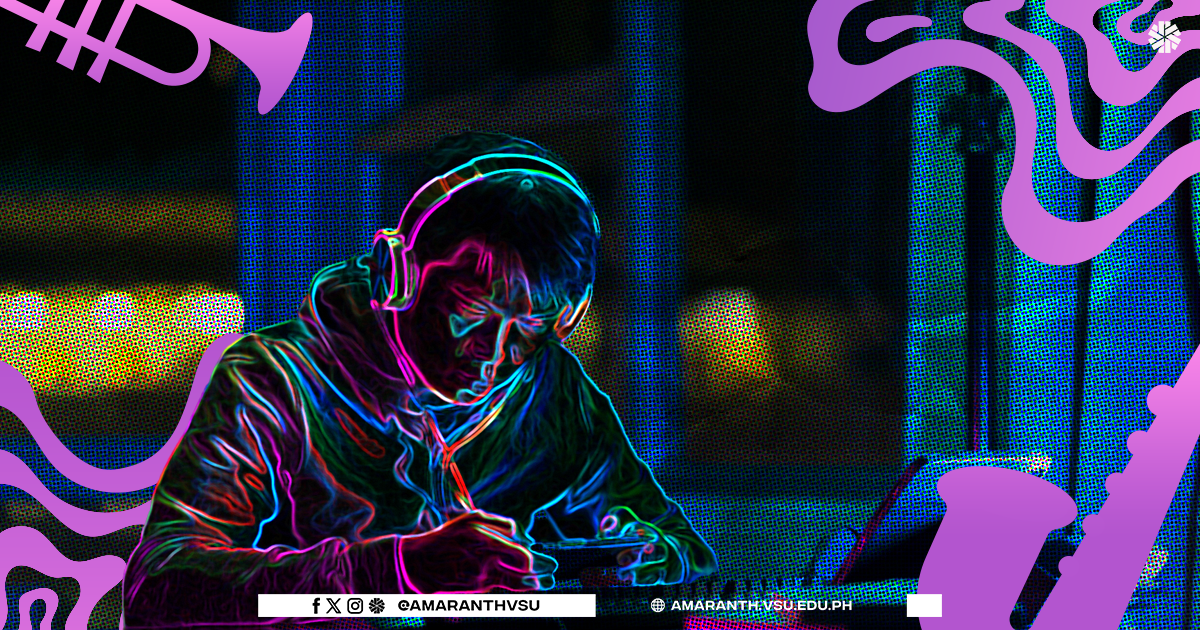Electronica as an Alternative Study Buddy
"Electronica as an Alternative Study Buddy" explores the benefits of incorporating electronic music into study routines, examining its potential to enhance focus and productivity.

(Graphics by Kacey | Amaranth)
Imagine this: low, mellow beats echoing throughout your ears and into your mind. It’s beating— thump, thump, thump— and it continues as you read your notes' contents. Have you experienced something like that?
Do you listen to music while you’re studying? With the final examinations coming in full gear this week, you are probably busy catching up on your lessons. However, doesn’t it seem complicated to function when you are alone? Studies show that listening to music while doing something helps boost your capacity and empowerment. If you’re looking for another sign to find a new study buddy, this article is for you.
Music and Its History
Music has been around for a long, long time. Historians recorded that the tasks our ancestors have been doing, such as farming, had once been accompanied by song (ever heard of Magtanim Ay ‘Di Biro?) as they worked under the sun. Until now, music has been used for various reasons: entertainment, comfort, and many others, hence why it has been around for so long (Schäfer and Sedlmeier, 2010).
Effects of Music
Although there has been a lot of discourse about the effects of music during one’s activities, there has been a rise in its positive impacts. Chia-Chun Wun & Yi-Nuo Shih (2019) conducted research between musicians and non-musicians and the results revealed that background music helps improve their attention performances. Apart from that, music has been scientifically proven to have positive physiological and psychological effects as well. For instance, exposing oneself to therapeutic music activities helps lower anxiety levels, helps in anger control adolescents and keeps them relaxed paired with improved self-confidence, manages behavioral and psychological symptoms of dementia, and increases heart rate, depending on the genre of music.
“Mozart Effect” Theory and the Arousal Mood Hypothesis (AMH)
A 1993 research presented a group of students who were examined as they took an IQ test, with Mozart’s music in the background. In the end, it was revealed that the students had a “temporally enhanced spatial IQ performance”— and that was the beginning of the Mozart Effect theory: listening to classical music helps in improving exam results. The Arousal Mood Hypothesis (AMH) was born shortly after; in fact, it has been long proven that AMH is the reason for the boost of arousal and memory performance (aka the drive to do and remember things). As a definition, AMH is the reason why people will try activities to maintain and/or increase the level of arousal. This is why some people will chase the high as they finish tasks to relish the moment of “sudden burst of motivation”. In short, the Mozart effect is the result of changes in mood and arousal.
The Case of Electronica and its Impact on Studying
Otherwise known as “Electronica”, it is a genre of music that uses electronic musical instruments and technology. These classifications of music are reproduced through electronic means, in terms of recording and editing. It is not only a genre but also considered a technique in music production. Popular derivatives include Nightcore, EDM, dubstep, new-age, and many more.
But in the case of studying, why should we consider Electronica? Well, although people’s preferences in music may vary (and it plays a role in one’s motivation), the mellow beats that the genre provides can help stimulate the mood and motivation of listeners which scientifically aligns with the findings of research focused on the impacts of electronica. Additionally, here are some reasons to pick electronica, apart from classical and lo-fi music:
1. Mood improvement. Its beats aren’t entirely loud nor too soft; it’s enough. Most of its music as well are upbeat and catchy. Zajonc (1965) pointed out that there is an optimal level of arousal, and human nature would seek it out. With the nature of electronica, the highs and lows are enough to stimulate one’s arousal.
2. With mood improvement, motivation and attention follow suit. Having a positive mood can help in motivating you to do tasks. Kotsopoulou, Anastasia, and Hallam, Susan (2010) in their research showed that with music, mood can be a determinant in decision-making (or in this context, choosing to study.
3. It also draws out the noise! Unlike lo-fi, where the noise is prevalent and sometimes intended in the background, electronica shuts out the “white noises”. Instead, the music, sometimes akin to human heartbeats, can contribute more to one’s undivided attention! If your attention span is that of a goldfish, then you should try listening to electronica instead!
The shortcomings of music
Depending on your study habits, not all students are comfortable with “white noise” in the background. In the same study conducted by Kotsopoulou et al (2010), the respondents found themselves turning the music off when they felt like it was interfering with their concentration. This was also examined in Christopher and Shelton’s (2017) paper, that students who learn how to control their attention well would know how to deal with “noises” in the background. Music, depending on its genre, can also change one’s mood easily (ever listened to BTS’ serotonin-boosting singles and suddenly shifted to Moira Dela Torre’s somber music?), as mentioned in Schellenberg et al (2007). Age and cultural differences seem to play a role as well (Schellenberg, 2007; Kotsopoulou, Anastasia, and Hallam, Susan, 2010). However, in the end, it all boils down to the listener and their music.
Now that you’ve reached this part, what are you waiting for? Lay out your reading materials, notebooks, pens, and paper— pop in your earphones and listen to these suggested playlists as you indulge in your daydreaming/studying sessions. After all, you have to face the music to see the results for yourself. Good luck, Viscans!
References
https://youtu.be/IN7ajebUVkI?si=T3mmn9xgvQMjFNTB","fple-mt":null,"type":"first-party-link"}">Electronic Music for Studying Concentration | Chill Out Electronic Study Music Instrumental Mix (https://youtu.be/IN7ajebUVkI?si=T3mmn9xgvQMjFNTB)
https://youtu.be/6J0DzHkAzoM?si=Ypkoh5PyPO4AgOLB","fple-mt":null,"type":"first-party-link"}">Music Mix 2023 🎧 Remixes of Popular Songs 🎧 EDM Bass Boosted Music Mix (https://youtu.be/6J0DzHkAzoM?si=Ypkoh5PyPO4AgOLB)
https://youtu.be/9wI4i899Y90?si=0lqlhSNXOqrrL8Zg","fple-mt":null,"type":"first-party-link"}">the long way home // dark electronic & wave music mix (https://youtu.be/9wI4i899Y90?si=0lqlhSNXOqrrL8Zg)
Related Stories

Amaranth Frequently Asked Questions (FAQs)
"Amaranth Frequently Asked Questions (FAQs)" addresses common queries about Amaranth, providing concise and informative answers to help users better understand its features and uses.

Inside the mind of an upcoming 4th-year student in this pandemic
"Inside the Mind of an Upcoming 4th-Year Student in This Pandemic" provides a glimpse into the unique challenges, thoughts, and experiences of a student approaching their final year amidst the ongoing pandemic.

ML50: Remembering the Martial Law Victims
"ML50: Remembering the Martial Law Victims" reflects on the 50th anniversary, acknowledging the impact and honoring the victims of Martial Law through poignant remembrance.

Santa's shopee xpress
"Santa's Shopee Xpress" unfolds a whimsical tale, blending the magic of Santa's world with the convenience of modern e-commerce, creating a delightful prose adventure.
